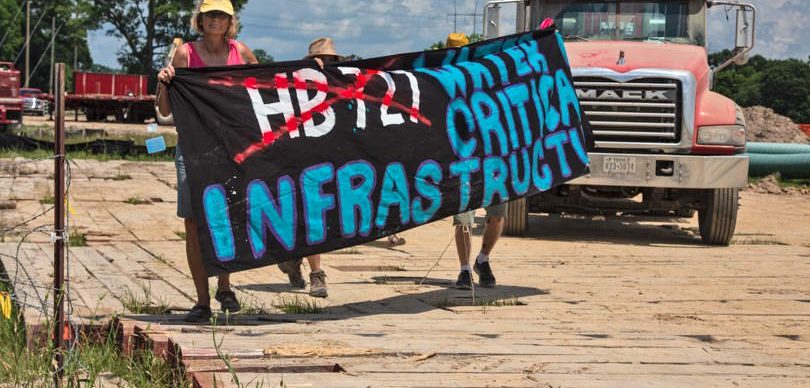
By Sasha Irby
Around the country, big energy companies are bribing politicians to pass laws that severely criminalize the protest of dangerous and costly oil and gas projects such as the Dakota Access Pipeline and the Bayou Bridge Pipeline.
These anti-protest laws have gone into effect in eight states already. In Texas, the legislature is currently considering a bill that would that would make the protest of a pipeline a third-degree felony. This means that a peaceful water protector would do the same amount of time as someone convicted of attempted murder. In Louisiana, a law (HB 727) went into effect last year which makes it a felony offense to trespass on “critical infrastructure”—a category that the law expands to include pipelines, any pipeline construction site, and “all structures, equipment, or other immovable or movable property” located within the pipeline site. More than a dozen peaceful protesters have been arrested under the new law.
On May 22 a federal lawsuit was filed by three organizations—RISE St. James, 350 New Orleans, and the Louisiana Bucket Brigade—as well 10 individuals affected by the new law. They argue that the law could be used to criminalize anyone who happens to be near the 125,000 miles of mostly unmarked pipelines that criss-cross the state of Louisiana. St. James residents are concerned the law would prohibit them from speaking out against the petrochemical industries that have turned their home into “Cancer Alley.”
How it is that we live in a state that is willing to spend millions of dollars attacking peaceful water protectors in the name of “critical infrastructure” while New Orleanians live with Sewerage and Water Board infrastructure so broken that we have frequent boil water advisories and pumps that can’t keep our streets from flooding in routine rainstorms? Is a water system that provides safe drinking water not critical infrastructure? Are safely navigable streets not critical infrastructure?
Why aren’t we issuing felonies to the crooked bureaucrats selling our wetlands off to petrochemical companies which are killing local ecosystems and threatening the very existence of our coastal communities? Because the state cares more about protecting the profits of the energy companies than it does about our public health or safety.
Among the many petrochemical and energy companies that pushed HB 727 were Energy Transfer Partners, Embridge, and Transcanada, all of which were involved in the construction of pipelines that have been met with protest in Louisiana. All three of these companies also financially contributed to Louisiana state representatives who co-sponsored the bill. At least 16 of the bill’s co-sponsors are affiliated with ALEC (American Legislative Exchange Council), a right-wing task-force controlled by billionaires like the Koch brothers. Across the country, ALEC has pushed to enact laws that favor corporations—mainly oil and gas companies—at the expense of the public.
It is obvious that these laws do not protect the people or infrastructure that is “critical” for the public good. The energy companies are buying off politicians and fast-tracking these laws because they hope that they can stop communities from protesting the destruction of their homelands. The politicians are criminalizing free speech while subsidizing the planet-killing corporations. Worse, they are criminalizing those who fight for the future of our planet. We cannot stand by idly while our water protectors are made into criminals. We must unite with other communities in the struggle against the oil and gas executives and the state which is attempting to silence us. We must not let fear swallow our voice.
